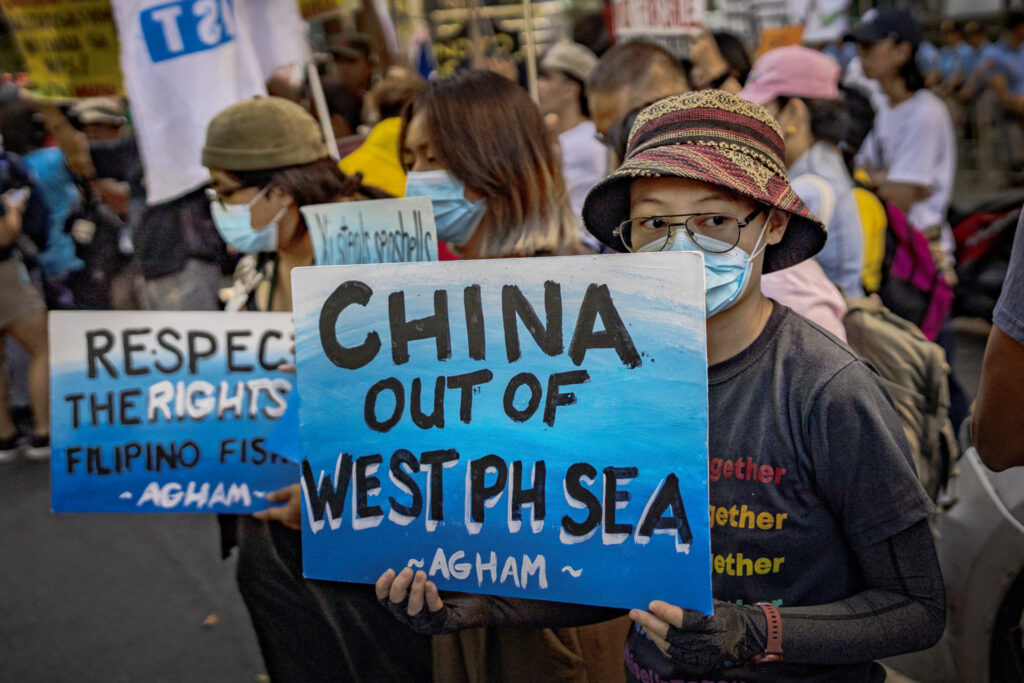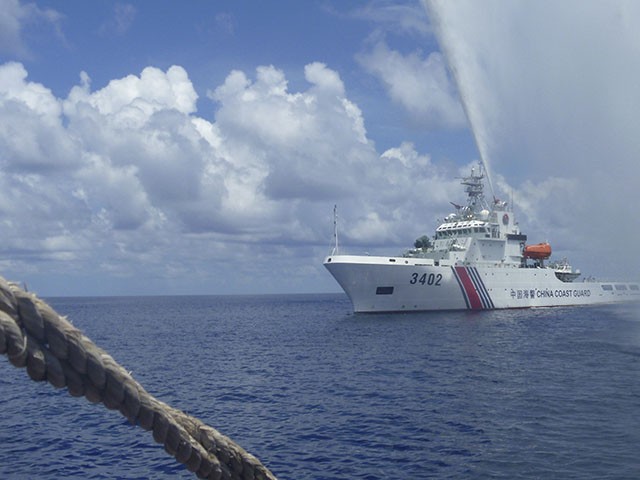2024-04-12 14:09:24
President Joe Biden held a summit with his Philippine counterpart, President Ferdinand Marcos, Jr., and Japanese Prime Minister Kishida Fumio Thursday in which the three largely focused on the threat communist China presents to its neighbors in the South China Sea.
The summit was the first of its kind including the three countries and followed an extended visit by Kishida to Washington, in which he addressed Congress and was feted with a state dinner, one of America’s highest honors for a visiting head of government. Marcos arrived and received his own meeting with Biden separately before sitting down to discuss deepening ties with both Biden and Kishida.
The assertive tone against China’s belligerence in the region contrasted with the conciliatory attitude that Biden and his administration has adopted toward China. Biden told genocidal Chinese dictator Xi Jinping in a phone call in early April that he opposes “decoupling” economically from communist China and that its attempt to strengthen alliances with regional countries was not “targeted against China.” Similarly, Treasury Secretary Janet Yellen, on a trip to China last week, insisted that most trade between China and America was “beneficial and the great majority of it is uncontroversial,” opposing calls to limit Chinese access to American markets.
In contrast, Kishida is facing growing concerns at home that China is moving to colonize its Senkaku Islands in the East China Sea. In the Philippines this week, protesters demanded Marcos do more to protect the sovereignty of the island nation, destroying effigies of Xi.
WATCH: Different organizations – whether on foot or on bikes – converge in Makati City on April 9, Araw ng Kagitingan, to protest China’s actions in the West Philippine Sea, including harassment against soldiers, scientists, and fisherfolk.https://t.co/06IIjzLbbs pic.twitter.com/vGQQUDV91Q
— Rappler (@rapplerdotcom) April 9, 2024
The joint statement following the trilateral meeting focused in detail on concerns that the Chinese government is attempting to colonize parts of both the South China Sea and East China Sea, addressing China by name as a threat to all three powers. The statement elicited an irate response from Beijing, whose Foreign Ministry accused the three nations of attempting to “bully” its neighbor and insisted China’s illegal military development in the South China Sea was “beyond reproach.”
“We express our serious concerns about the People’s Republic of China’s (PRC) dangerous and aggressive behavior in the South China Sea,” the three leaders said in their statement. “We are also concerned by the militarization of reclaimed features and unlawful maritime claims in the South China Sea.”
Also with regard to the South China Sea, the leaders manifested their “serious concern over the PRC’s repeated obstruction of Philippine vessels’ exercise of high seas freedom of navigation and the disruption of supply lines to Second Thomas Shoal, which constitute dangerous and destabilizing conduct.”
They offered their “strong opposition to any attempts by the PRC to unilaterally change the status quo by force or coercion in the East China Sea, including through actions that seek to undermine Japan’s longstanding and peaceful administration of the Senkaku Islands.”
The statement affirmed the legality of a 2016 decision by the Permanent Court of Arbitration at the Hague that found China’s claims in the South China Sea illegal. China claims almost the entirety of the sea, its islands and natural resources, through a map known as the “nine-dash line” which cuts into the sovereign territory of the Philippines, Vietnam, Taiwan, Brunei, and Malaysia, and skirts the maritime border of Indonesia’s Natuna islands.

Filipino fisherfolk and activists take part in a protest condemning China’s maritime harassment, outside the Chinese Consulate on February 6, 2024 in Makati, Metro Manila, Philippines. Chinese hackers attempted but failed to infiltrate the Philippine president’s and government agencies’ websites and email systems, including the Department of Information and Communications Technology (DICT) and the National Coast Watch, according to DICT spokesperson Renato Paraiso. The attacks, targeting President Ferdinand Marcos Jr’s personal website among others, occurred amid rising tensions with China over the South China Sea disputes. (Ezra Acayan/Getty)
“We call on the PRC to abide by the ruling,” the leaders of America, Japan, and the Philippines stated.
The extended statement touched upon several other key topics, including the creation of the “Luzon Economic Corridor,” an apparent attempt to challenge China’s Belt and Road Initiative (BRI), a global infrastructure plan in which Beijing offered predatory loans to poor nations to be used on infrastructure projects. The Luzon project, named after the largest island of the Philippines, will offer “coordinated investments in high-impact infrastructure projects.”
The three leaders reportedly also addressed topics unrelated to their nations but considered critical for the Biden administration, such as the Russian invasion of Ukraine and the “climate crisis.”
Chinese Foreign Ministry spokeswoman Mao Ning offered an incendiary response to the summit on Friday, condemned the meeting generally and the joint statement’s focus on China specifically.
“We firmly oppose any acts that stoke and drive up tensions and harm other countries’ strategic security and interests. We are seriously against forming exclusive groupings in this region,” Mao fumed.
Mao declared that the entirety of the summit was a “smear and attack against China” and disputed the legitimacy of the Hague ruling on multiple occasions.
“China does not accept relevant countries’ groundless accusation and deliberate smears against us on the East China Sea and South China Sea,” Mao asserted. “China does not accept the illegal arbitral award on the South China Sea or any unilateral moves based on the award. The situation in the East China Sea and the South China Sea is generally stable.”

In this Sept. 23, 2015, file photo, Chinese Coast Guard members approach Filipino fishermen as they confront each other off Scarborough Shoal in the South China Sea, also called the West Philippine Sea. (Renato Etac, File/AP)
Mao claimed China has “indisputable sovereignty” over the Japanese and Filipino islands discussed in the trilateral statement and condemned the three countries for also referring to China’s false claims over the sovereign state of Taiwan, appearing to warn of a potential invasion: “no one should underestimate the will and capability of the Chinese people to safeguard our sovereignty and territorial integrity.”
“The so-called arbitral award on the South China Sea is illegal, null and void,” she continued, answering a separate question about Kishida’s stay in Washington. “China’s territorial sovereignty and rights and interests in the South China Sea shall under no circumstances be affected by the award.”






